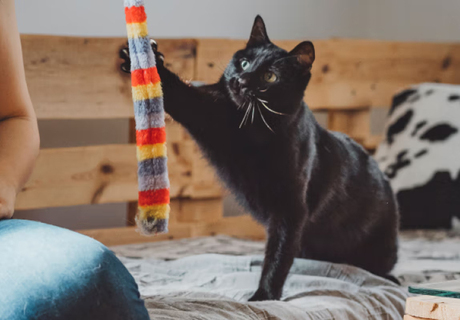
Featured Article
Cat Exercises – 5 Cat Workouts and Fitness Tips
Cat exercises are an essential tool to helping your feline companion maintain a healthy weight. Of course, fitness has other benefits as well. It keeps your cat mentally stimulated while building muscle.
Weight management is especially important, however, as more than half the housecats in the United States are considered overweight or obese. Overweight cats are at a greater risk for diabetes mellitus, osteoarthritis, injury, as well as heart, respiratory and kidney disease.
A diet of complete and balanced cat food can help, but exercises for cats to lose weight are key to preventing excessive gain.
Healthy Cat Exercises
Not sure where to start on your pet’s fitness journey? Here are five workouts they may enjoy.
1. King of the Jungle Gym
Jumping onto perches and digging into scratching posts are great ways for your cat to stretch, tone and burn calories.
Additionally, climbing is appealing to many cats and a good workout. Having a vertical climbing tree available and adding cat-sized shelves or ramps in key locations (beds or windowsills, for example) gives them the chance to climb, and makes their environment more interesting.
Also consider providing a scratching post covered in a tightly woven natural fiber so your cat can tone their back and shoulders as they dig in with their claws – or paws.
2. Play Partners
A play “partner” can include everyone/thing from you to another cat, or a toy. Want to join in the fun? Try dragging a toy around or rolling a milk jug lid and watch the chase begin.
To get your cat interested in toys, introduce them to a variety of objects of varying shapes and sizes. These can include common household items such as a crumpled-up ball of paper, ping pong balls, or a paper bag with a treat inside.
Many cats like to explore, so place their toys or treats in different rooms around the home. If they lose interest over time, change locations to keep them engaged.
Remember that your cat may not be interested in all of their new toys and games. In addition to the type of object, your pet’s preferences may also determine what they play with. Cats who prefer stalking over chasing, for example, might take to certain toys and activities over others.
Also consider introducing a second cat to your home. Having another playmate will help ensure your cat exercises even while you're away.
3. Interactive Feeding
If your vet determines that your cat is already overweight, discuss reducing your cat's portions or switching to a food formulated for weight management. (Learn more about how to help your cat lose weight.)
You can also make your cat work for food by using a feeding toy. Feeding toys are interactive and require your pet to play with an object in order to access their food.
Some objects are balls while others are more complex feeders that your cat must navigate with their mouth or nose.
4. Tackle the Great Outdoors
If you’re interested in exercises for cats to lose weight, train your pet to walk outdoors on a leash and harness – they’ll get active while staying safe from dangers like other animals or cars.
Another option? Swimming. (Yes, really!) Contrary to popular belief, cats can be taught to swim. This fitness-boosting activity allows an overweight cat to exercise with less strain on already-stressed joints.
5. Get Competitive
Competitive play encourages your cat to watch you for cues while moving through an agility course that includes ramps, steps, poles, tunnels and hoops.
Train at home and then consider entering competitions. Even if you decide to not “go pro,” this activity still fosters emotional bonds and encourages greater levels of fitness.
Navigating Cat Fitness Challenges
Finding the right cat exercises for your pet will depend on their individual preferences and health. If your cat doesn’t seem interested in physical activity at first, consider why. Do they seem bored? Is there a lack of stimulation in their environment? Are they in pain?
Remember, not all cats are the same. Some are more low-key and may not respond to all of your efforts; be patient and try a variety of activities and toys.
How Often Should My Cat Exercise?
Generally, a cat should exercise around 30 minutes per day. This can be broken up into different-length sessions. Kittens may need significantly more physical activity.
Cat Workout Tips
Safety is always an important factor when it comes to cat fitness. Potentially dangerous items like string or rubber bands (or anything that can be ingested) should be kept out of reach, especially with kittens.
Speaking of kittens, don’t let them nip at your hands and feet during playtime. If you don’t teach them this is unwanted behavior, they may continue to do it as they grow.
Want more behavior and dietary tips? Get insight from our experts on our Pet Expertise page.
